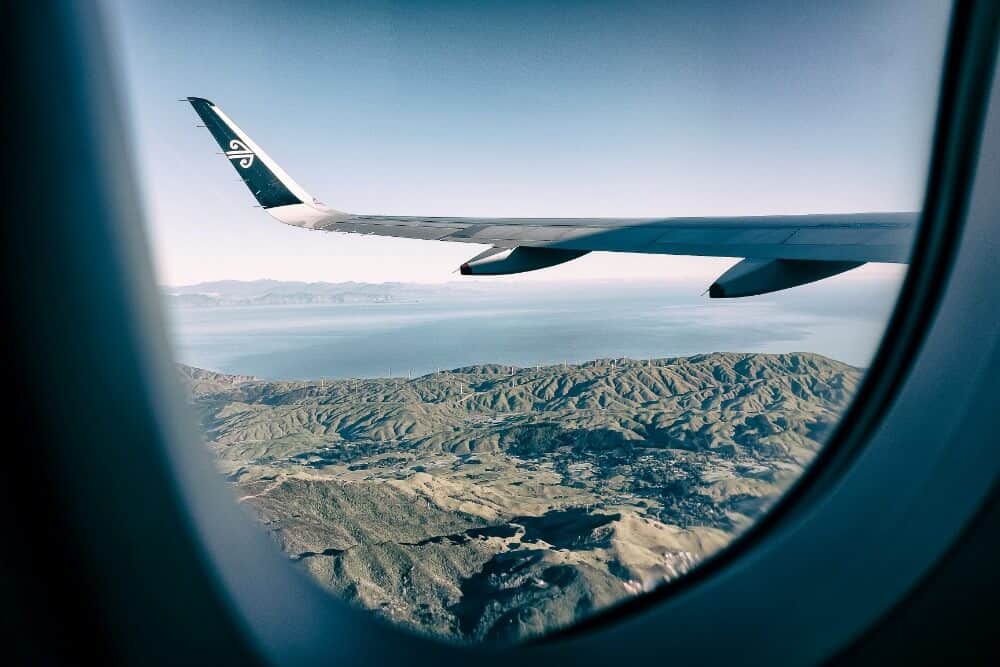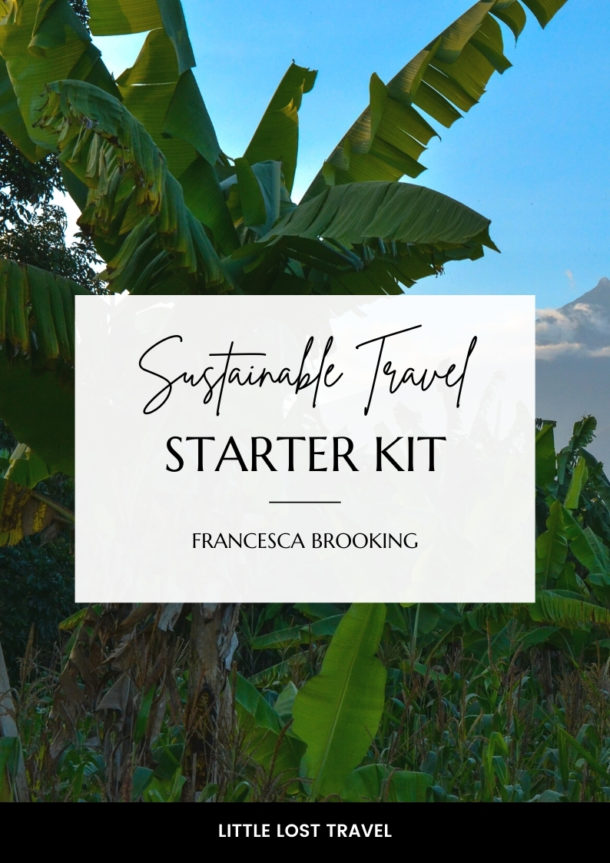Environmental guilt, otherwise known as environmental syndrome, eco guilt or green guilt is a very real issue. It essentially means the feeling you get when you felt like you could have done more for the environment but chose not to.
Sparked by the increasing concern about our environmental impact, it’s not unwarranted when climate change just seems to be getting worse. Try as we might, an impending climate disaster seems to only be getting closer.
So where does travel fit into all this? Responsible for 8% of global greenhouse gases, we can’t deny its environmental impact. If we’re to make a serious effort to save our planet, shouldn’t we stop travelling altogether?
Just like most industries, the reality is there are many factors at play. It’s not as clear-cut as simply never travelling again. Businesses across the world rely on tourism. It helps fund conservation projects and raises awareness of important environmental issues – and that barely scratches the surface.
So, how can we alleviate environmental guilt as eco-conscious travellers? I found my peace through learning to find a balance, striving to do better rather than be perfect and accepting when things are out of my control – but it wasn’t always the case.
Why I’m not a perfect sustainable traveller

Photo credit: Ishvani Hans
Back in September 2018, my travels took me to Fiji. It was everything I had imagined and more: golden sandy beaches, swaying palm trees and clear blue waters. It was paradise, but during my trip, I felt niggling waves of guilt. I had done something I had sworn to avoid – I was drinking water out of single-use plastic bottles.
I know, I know, it seems a little dramatic with all things considered.
But even so, I felt anxious about it and it only got worse with the thought about where they would end up when they were empty. Would they get recycled or would they end up polluting this beautiful place?
In the UK alone, around 5.5 billion plastic water bottles end up in landfills or enter the environment and waterways. Plastic itself takes up to 1,000 years to decompose and before that, it breaks down to become microplastics which infiltrate and damage food chains.
So, was I contributing to the pollution of the planet?
I felt like a bad traveller, let alone a sustainable traveller. Even more so when I had come prepared with my trusty water filter bottle that boasts the capacity to make the likes of pond water safe. I had no excuse.
Except perhaps I did.
Opting for plastic bottles in countries that are considered to have unsafe drinking water for travellers is the easiest solution. They can make the difference between an anxiety-free trip and worrying about whether you’re going to get ill. Or worse, actually getting ill.
A part of me was fairly confident that if I used my water filter bottle I would probably be fine but I didn’t feel comfortable taking that risk (even though I was aware that plastic water bottles can still contain an alarming amount of mould, microplastics and other nasties).
Read More: Paradise Lost? How Climate Change Is Affecting Small Island Nations
The reality of environmental guilt

Photo credit: P T
I soon realised that when it comes to making decisions that have the potential to affect your health you should never feel guilty.
Travel opens up a world of new and exciting places. It’s a gift, but when you’re somewhere unfamiliar, the choices you take for granted at home can have different consequences. In these situations, you will go with what you know rather than take the risk. It’s a basic survival instinct.
Here’s the thing, environmental guilt is real and with good reason. The world as we know it is changing. Record temperatures are a regular occurrence, sea levels are rising and storms and forest fires are becoming more deadly.
The message is clear. Something has to be done but on an individual level, it feels all too overwhelming. We feel powerless.
On top of that, we feel guilty about the environmental cost of our travel habits, plastic consumption and food waste. There is a lot to do but it feels like no matter what, it won’t be good enough.
It’s so easy to fall into a pit of anxiety because you bought a plastic water bottle or your kitchen isn’t as zero waste as it could be.
Even tourism is now a source of concern. If we are to be truly sustainable then isn’t the greenest option to just stay home so we don’t contribute to the increasing amount of carbon emissions in the atmosphere? In that case, is sustainable travel, like green travel, responsible travel and ecotourism, a bit of a paradox?
Read More: What Is Ecotourism and Why Is It Important?
Why it’s about doing better, not being perfect

Photo credit: Chema Photo
For me personally, being a sustainable traveller isn’t about having environmental guilt wherever you go, nor is it about being the best environmentalist. True, it helps to make an effort to be greener – I don’t deny it, but it goes much deeper than that.
I believe that it’s about doing better rather than being perfect.
Why?
Perfection is impossible and when we put it on a pedestal we set ourselves up to fail if we try to achieve it. We’re only human, after all.
Rather than worrying about being zero waste etc, start with changing the language to mean that you are trying to minimise your impact where possible. Don’t feel pressured by labels and know that some things are out of your control.
If we also try to travel consciously, we can gain a deeper appreciation for the places and people we interact with. This can help us understand more about their societal and environmental issues. We can learn to offer a direct positive impact, whether it’s through building friendships, supporting small businesses and donating to conservation efforts.
Sustainable travel is all about adapting to global changes to make tourism more durable. It’s a meaningful form of travel which educates and enriches our lives and the lives of the people we meet.
Knowledge is the first step towards real growth and change.
Discover more about how you can experience meaningful travel through these ethical travel companies.
A note on Flygskam

Photo credit: James Coleman
Flygskam or ‘flight shame’ is a term that was first coined in Sweden in 2018 to describe the guilt experienced by environmentally-conscious travellers about flying. It’s a movement which has spread across the world – particularly in Europe and the US.
While flygskam has opened up the conversation about the detrimental effects of aviation on the environment, whether or not you should or shouldn’t fly is a debate which is slightly more nuanced.
Of course, we should all make an effort to fly less when we can but I don’t think we should shame people about their flying habits.
Criticising, cancelling or attacking someone about their values won’t open up discourse and it won’t encourage any real change to happen. If anything, they just get more set in their ways (you can read more about this in Nomadic Matt’s article on ‘flight shaming’ here).
Not flying is also easier said than done when it’s often the most convenient, time-efficient and affordable way to travel.
A lot of people don’t have the luxury of spending hours or even days getting to a destination. For someone who only has a certain amount of time off a year, flying is usually the better option if they want to go abroad for a week or two.
Shaming someone about flying comes from a place of privilege. You’re basically telling someone that they shouldn’t have the right to a holiday if they don’t have the time or finances to do it the ‘right’ way.
Read More: Two Responsible Travellers Share Their Sustainable Travel Tips
The key is to find a balance

Photo credit: Rolands Varsbergs
The key to being a more environmentally-conscious traveller without the guilt is to find a balance. Aviation is not the sole contributor to climate change. In fact, energy consumption is the biggest human-made source of greenhouse gases worldwide – responsible for an enormous 73%.
So, instead of feeling anxious about flying, explore ways you can mitigate your carbon footprint in other areas of your life.
Finding ways to avoid flying where possible, staying in sustainable accommodation, doing ethical tours and activities and eating at local, independent restaurants are all good ways to lower your carbon footprint while travelling.
You can also create more balance in your lifestyle by eating less meat, walking or cycling instead of driving, swapping chemical cleaning detergents for eco-friendly alternatives and voting for politicians who are prepared to fight for your values.
It’s also important to remember that you alone are not responsible for saving the planet – it’s impossible. We can all recycle as many plastic bottles as we want but the reality is nothing is going to change until government policies and large corporations make some serious reforms.
Just to put it into perspective, a report by the Carbon Disclosure Project found that just 100 companies were responsible for 71% of the world’s carbon dioxide emissions since 1988.
Each of these companies, mostly oil and energy giants, have a carbon footprint that’s bigger than some countries. This won’t change unless we stop our reliance on fossil fuels.
Learn more about how to be an ethical traveller here and what to look out for in a sustainable travel activity here.
Final thoughts on environmental guilt

Photo credit: Kalen Emsley
Climate change is a very serious threat to our planet and we can all do our bit to help. However, striving to be perfect both on your travels and in your lifestyle will only set yourself up for environmental guilt.
More people making an effort to be better is much more effective than a few who are perfect.
When it comes to our environment, a lot of things are out of our control but what we can do as travellers is strive for empathetic and meaningful travel experiences. That way, we can have a positive impact where it matters most.
Read Next
Top Travel Tip That Will Save the World

Pin me for later!
This post may contain affiliate / compensated links. As an Amazon Associate, I also earn from qualifying purchases. For full information, please see my disclaimer here.





Great post, Francesca. It’s not about being perfect and being unable to enjoy yourself. I’ve struggled with a bit too. But it’s true. More people making an effort is better than a few who are perfect. Thanks for sharing!
Thank you! Definitely, otherwise, you end up beating yourself up for things that aren’t really in your control.
Loved this, Francesca! You’re right, we can’t be perfect. I love that you and many are doing their best to both support the travel industry and wander where your soul takes you. There’s definitely a balance!
Thank you!
Another great article Francesca. I’ve often had that niggling feeling too about plastic bottles but knowing it was necessary. I do wonder if a life straw bottle is the answer. Of course I have the same issues with flights but it’s so hard to get out of Ireland otherwise. Sigh.
Thank you! I think LifeStraws can be great – although it’s worth bearing in mind that they don’t carry a huge amount of water so you’ll need to fill it up several times a day.